15 Ways to Simplify Your Homeschool (FREE PDF download)
Homeschooling can be hard work, but there are many ways to simplify your homeschool! Find out how we’ve done this with our own five busy children, and how you can too.
Here we are again, back on our mission of MYTHBUSTING – and tackling today the idea that having your children at home for their education is always and necessarily difficult. I disagree with this thought, and I’d love to encourage you to simplify your homeschool so that your children will be happier, you will be happier, and yes, they will even learn more. Because, honestly, who can learn well in a high-stress, emotionally-charged environment?? Not me, and probably not my kids either.
Now, as with every Myth Surrounding Homeschool, there is a grain of truth at the center (though it’s surrounded by a big kernel of nonsense); so I must clarify that yes, homeschooling your children will be hard at times. But, you know what? Parenting is hard at times. Marriage is hard at times. Life is hard at times. This doesn’t always mean you’re doing something wrong.
So, while I am a big believer in simplifying your homeschool so that, most days, you are a peaceful mother who is mostly satisfied with the general flow of how things are going, it doesn’t mean that there won’t be bumps along the way and issues with kids and issues with yourself and difficult seasons and trials to overcome.
Please hear what I am not saying: I am not saying that homeschool is easier than public school; I am not saying that homeschooling will solve all your children’s problems; I am not saying that if you have a hard day – or even a hard season – of homeschooling you are doing something wrong.
Rather, The Myth I want to address is the idea that taking charge of your child’s education is an overwhelmingly stressful burden, and that homeschooling must be complicated, complex, and draining every single day.
If it is – if you find yourself continually stressed, discouraged, overwhelmed, and struggling to finish what you planned to do – I have a few gentle suggestions for you, speaking to you as a friend and fellow mother who has been working hard to simplify her own homeschool for the past seven years, through multiple pregnancies and newborns and toddlers and neurodivergent children and all the accompanying chaos. Some ideas might make sense for you – others won’t at all. Take what you like, adjust it for your own unique family, and ignore the rest! I hope that these ideas will spark more ideas of your own and encourage you to relax a bit, trust the process, and savor these short days with your own precious children.

15 Ideas to Help You Simplify Your Homeschool
1. Combine your children for lots of subjects. Listen, it is categorically impossible to do all the subjects separately with all the children. Do not attempt this. They also DO NOT NEED separate “grade level” adaptations of every subject – this is an unnatural construction of our public school system. Read to them all from the same history book, science book, poetry, literature, fairy tales, Bible stories, or whatever else you think of.
2. Use morning time. This is when you can do these things all together, and it’s a beautiful time. Of course you could stick it in the afternoon, or the evening, or whenever works for you – but the simple premise of the idea remains the same. Gather everyone together, read something beautiful, and talk about it. It’s so very simple and so very good.
3. Consider the basics. Our basic priorities are read alouds, phonics or copywork, math, and piano practice. Yours might be different; but we start our planning by focusing on those, and then only add in more if we truly have time.
4. Plan for margin in your day. Before you add in any extras, make sure you plan margin in your homeschool day. If you want to spend 20 minutes a day on math, schedule a 30 minute time block. You will almost certainly need it, and then when extra things pop up and you do need more time, you won’t feel so frazzled.
5. Plan ahead for play and rest. Again, when planning your homeschool day, schedule in down time. Your kids need to play, you need to rest, and if you make space for it ahead of time, everyone will be happier. Your life will feel simpler, like it has room to breathe!
6. Focus more on read alouds. The benefits of reading aloud to your children are myriad: it’s one of the few things we can do during our day that hits so many areas all at once! If you want a simple homeschool, you need to take full advantage of educational powerhouses like this. Plus, it’s easy to do and fun for all! I have never regretted any time we have spent reading aloud together.
7. Choose open-and-go curriculum. This means a curriculum where you do not have to do any lesson prep or planning beforehand; you can literally open the book, start reading the lesson to your child, and dive in. Many curricula will advertise this feature – if not, you may need to flip through the actual book to see if it requires any prep time.
8. Buy the science kit. Don’t try to save money by assembling all the science experiment materials yourself, unless you are super passionate about science and this is your number one priority. Based on my experience, science projects or experiments will not happen unless all the materials are right there on hand and ready to go. Simplify your day by letting someone else assemble your science materials for you!
9. Ask for help. Do you have a husband who wants to help, or a grandma who would love to be involved? Let them! Perhaps grandma would come over once a week to do an art project with the kids, or teach them to cook; perhaps dad will do a science experiment with them on the weekend or handle writing lessons in the evening. If someone is willing, let them help you – and then erase that subject from your brain so that you don’t have to think or worry about it anymore.
10. Embrace homeschool freedom. Let’s make this very clear: you are not re-creating public school in your home. Do not try to do so, or you will quickly burn out and your child will hate it. Instead, embrace all the freedom that comes with homeschooling and the many things that you can do much much better than the public school! No need for desks, or rigid timetables, or boring textbooks: you can do better. Let them have more frequent breaks, or fun colorful writing utensils, or snacks while they do math, or anything else you can think of to make school more enjoyable! Your life will feel simpler if you don’t put unrealistic expectations on yourself.
11. Be okay with not doing “it all.” Another mindset shift: you won’t do everything this year, and that’s perfectly normal. Perhaps focus just on your top 3 subjects and try to do those really well! Or make it a goal to read aloud for half an hour every day. Or try to get outside for two hours every day. The point here is: celebrate your successes even if they are not stereotypical “academic” ones, and remember that even the public schools never get to the end of every textbook. Life is simpler when we don’t try to cram in every subject, but instead focus on doing just a few things and enjoying them.
12. Make a plan for the toddler/baby. Going into a school year without at least a simple plan in mind for the toddler and/or baby is a recipe for stress. Maybe you can implement independent playtime; maybe you know you’ll do your best work during nap time; maybe you have a collection of toddler “busy boxes” that you are saving for special use during school time. Knowing what you will do with them and when will help to streamline your routine.
13. Write down what you did after, not before. Planning from behind, as homeschoolers call it, is a great way to reduce stress and give yourself confidence that you are in fact accomplishing many things. Instead of writing down on Monday that you want to finish 3 math lessons this week, and then feeling defeated when life interferes and you only finish 2 lessons, try this: don’t write down anything until Friday and then rejoice in the accomplishment of 2 whole math lessons being finished! It’s a slight mindset shift that can greatly improve your mood.
14. Read a few books about unschooling. Even if you think it’s a crazy idea, I have found that reading some books about unschooling has given me more confidence to loosen our schedule, give my children the play time they need, and relax a little without wondering whether or not they are “behind.” Just think about it – there are some people who don’t use any formal curriculum, let their children direct all their own learning, and their kids still graduate and live successful lives! Amazing. That style might not fit for you, but if the books are true, then we can certainly relax a tiny bit and not worry that we have failed our children if we didn’t have time to teach them a foreign language this year.
15. Be very picky about the extracurriculars you choose. It’s not only the actual homeschool part of our day that can make our lives feel overwhelming; if you’ve got multiple children and they are all committed to multiple outside sports/classes/co-ops, life quickly becomes ridiculously busy. If you are looking for a simpler life, you must say no to most things! It’s difficult to do when we have so many good choices – and harder as your kids get older – but if your priority is a simpler life with time to enjoy your family, it’s probably worth it.

Friends, homeschool doesn’t have to be complicated. Education doesn’t have to be boring.
Our children came into this world with fully-formed personalities, keen intelligence, and boundless curiosity; our job is simply to give them a feast of interesting ideas in order to keep their wonder alive.
If we can do this, however imperfectly, our homeschool will thrive – and our children will too.

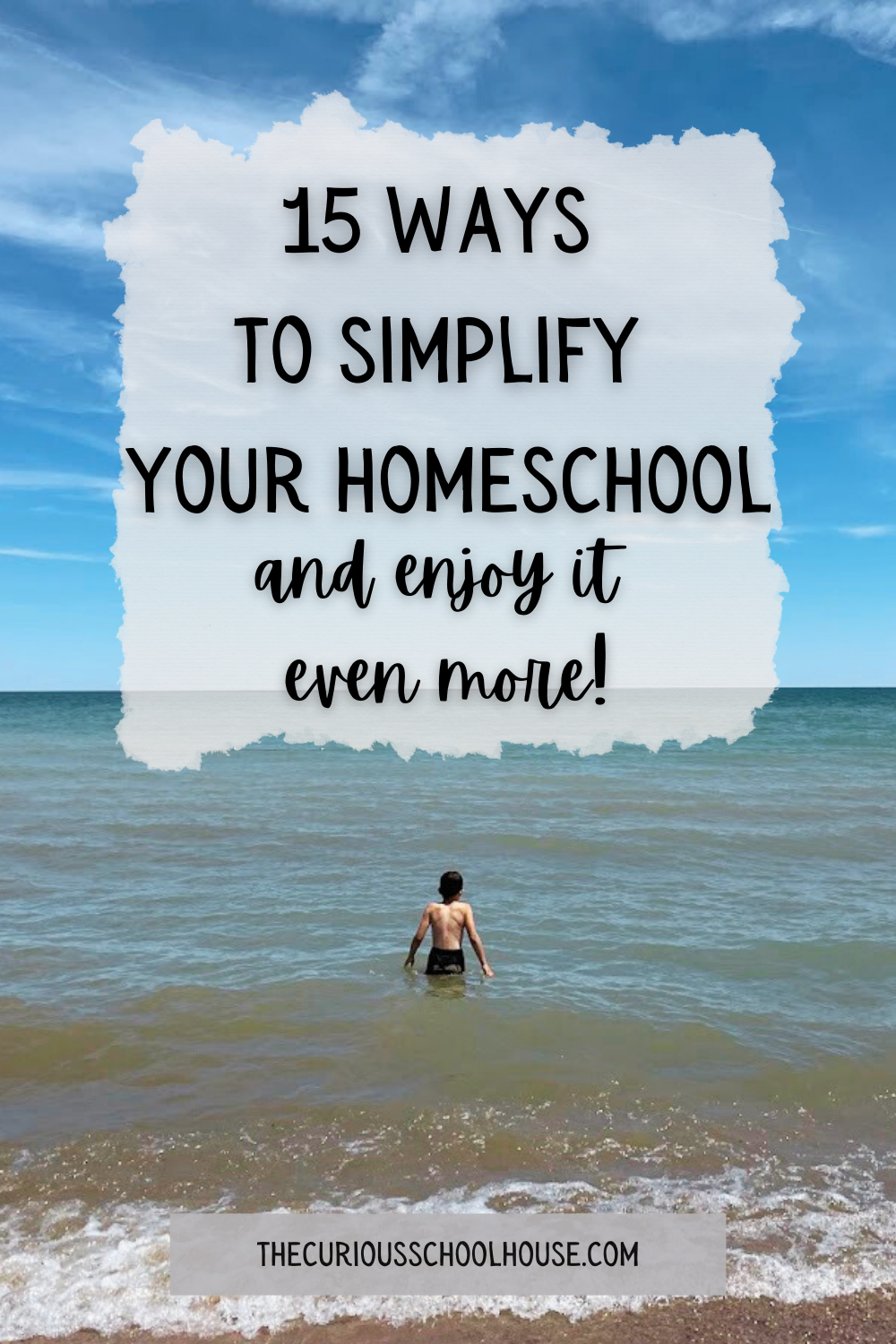
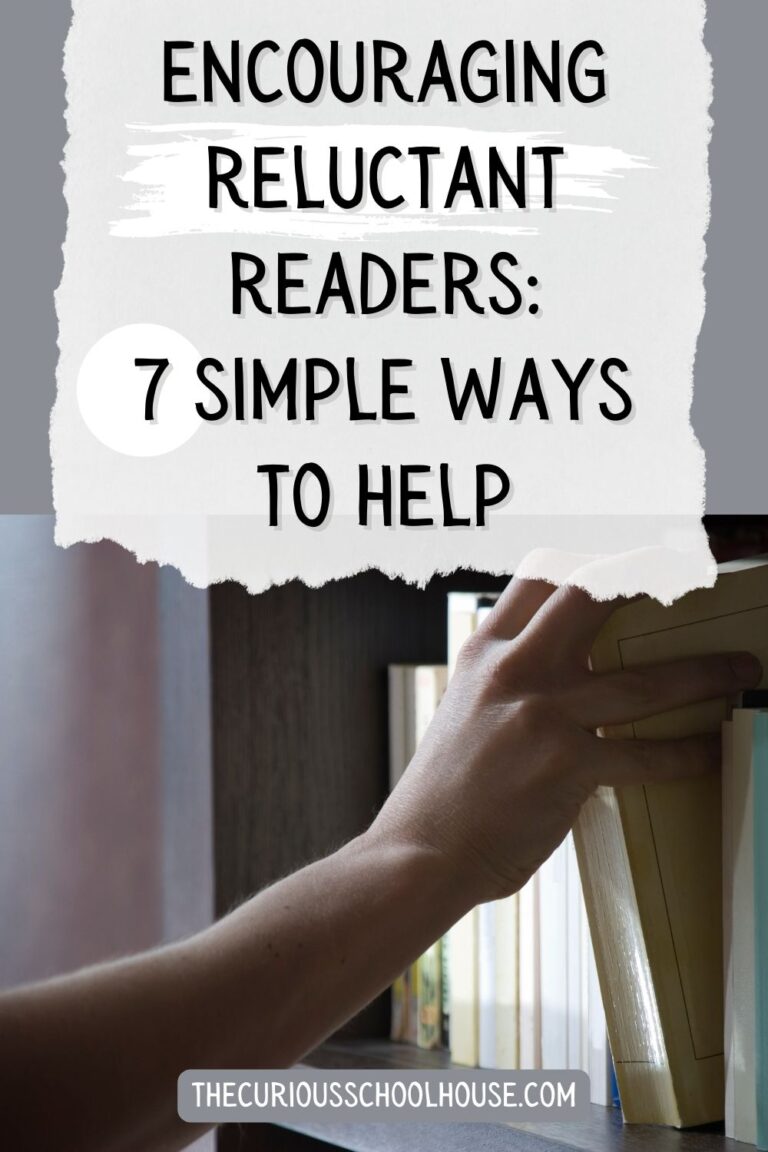
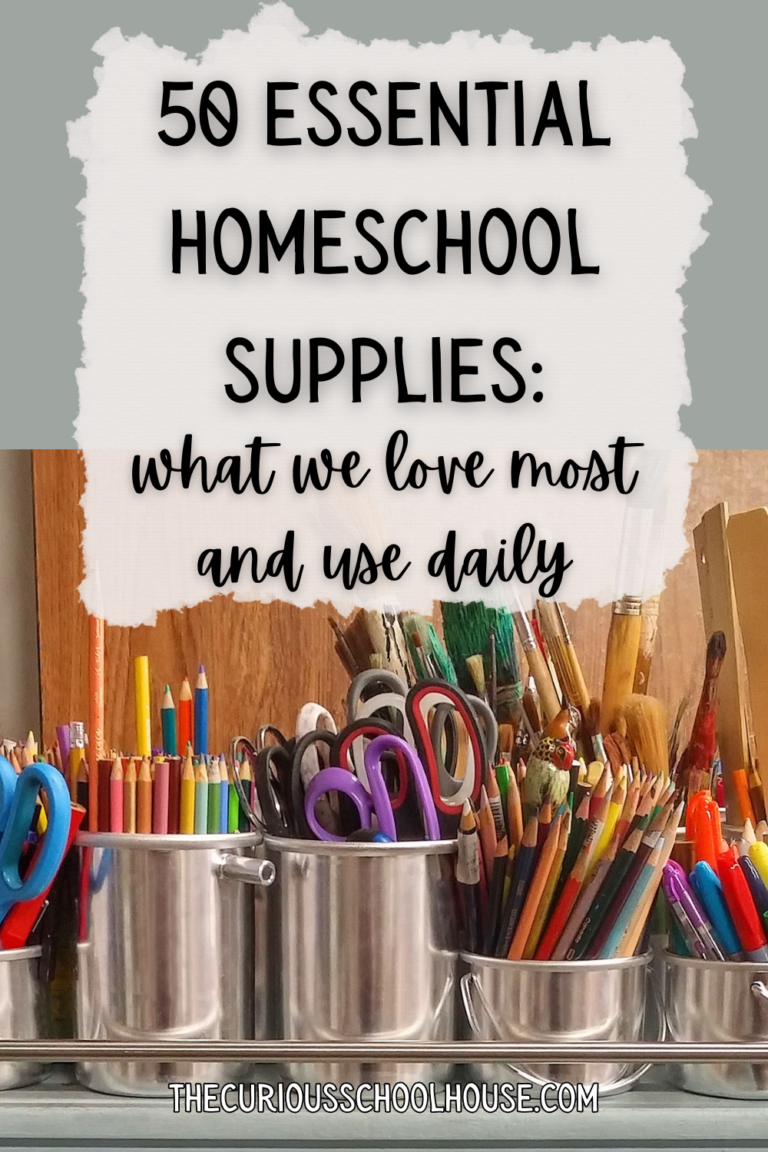
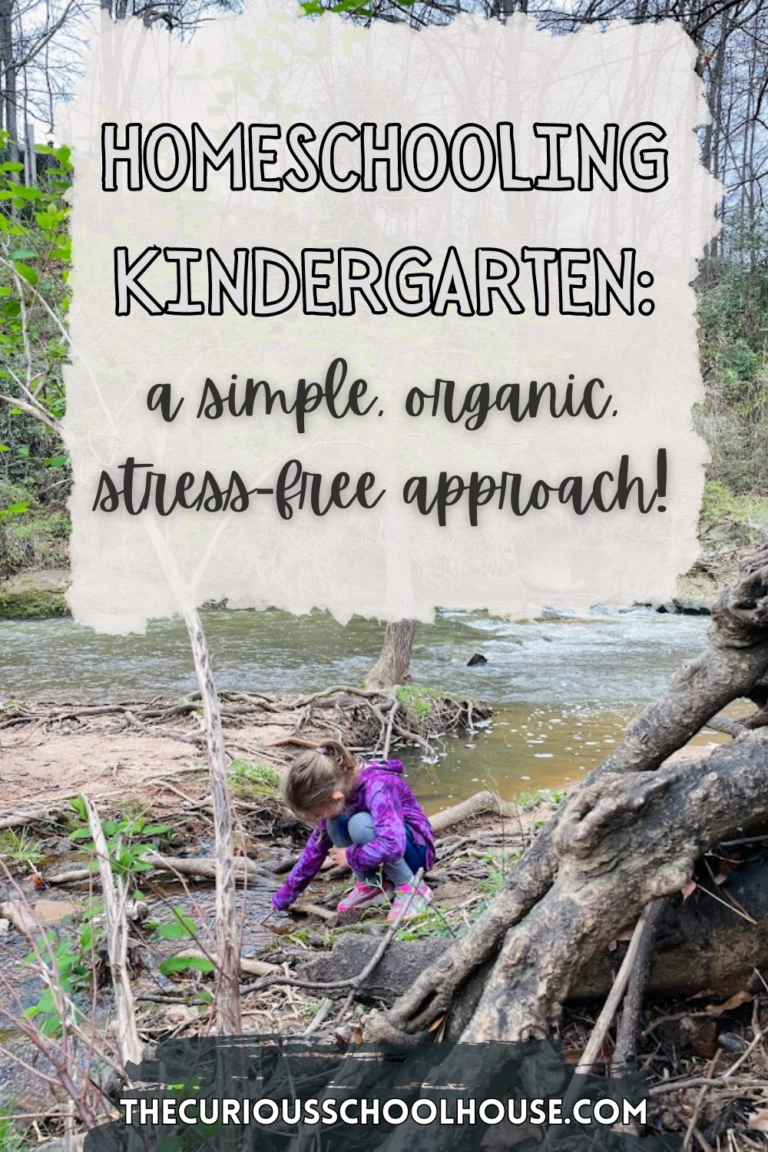


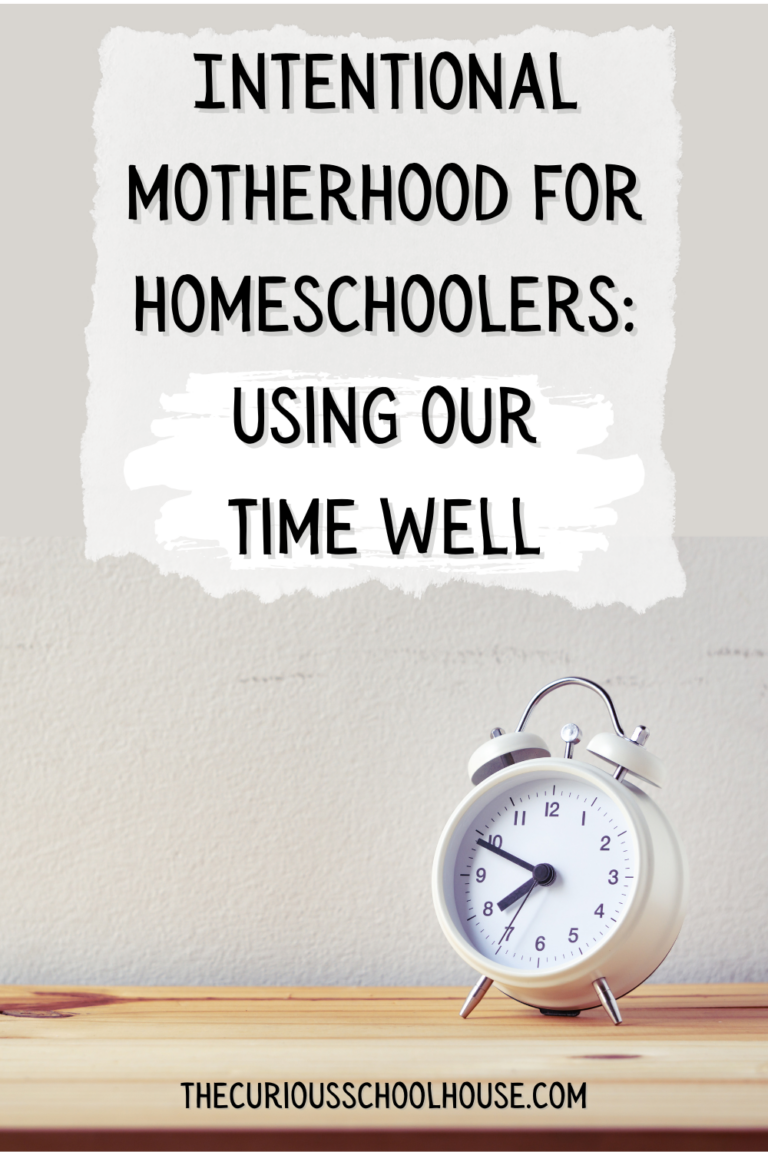
OMGH I love this! We have four kiddos and all but our youngest is now in “school”. I love the group lessons and simplifying things. We don’t need all of the “things” all of the manipulatives, all of the structure. It took me awhile to unschool myself but the simplicity that homeschooling can be is wonderful. Not always easy but a blessing.
I always love reading your tips. I’m about to officially start our new homeschool year next week. My kids are actually begging to start! But I feel like I’m not ready! Do you have any tips for children who do not want to participate in group learning? My 4-year-old instantly leaves whenever read-aloud time starts lol. She has no interest in hearing stories.
Hi! So exciting that you’re starting up a new year! 🙂 For kids who don’t want to participate… I would say it depends on the age and what you are reading. 4 is pretty young still and I probably wouldn’t push it, especially if you’re reading things geared towards older kids. Can you invite her to at least play in the same room? Even our 8 and 9 yr olds still like to play or have their hands busy while I am reading – sometimes this helps them focus! If you want to read something specifically to her and she won’t sit for it, I think that’s a skill that can grow. Start with short engaging picture books, and have her sit just a bit longer each time you do it. Listening to a story is a skill that needs to be practiced, but it will get better the more you do it!
Very insightful! Thank you for the tips!
Very helpful tips! My son is considering homeschooling his kids one day, and I find this encouraging.